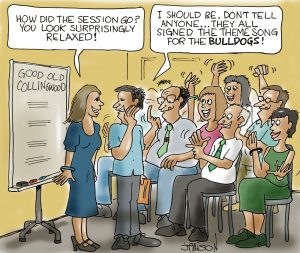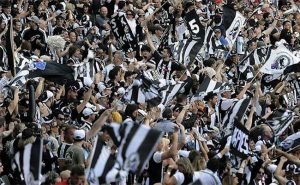MICHAEL UNIACKE recalls the time when the victory song of the Australian Rules football team, Collingwood, collided with Australian Sign Language.
AUSTRALIAN RULES FOOTBALL, known as AFL, is a brutal high-speed collision game. In each team, 18 over-muscled young men use their bodies as weapons, crashing into opponents as they run around a large paddock, chasing an oblong leather bag of wind to pass it by hand and foot to each other and then between tall sticks at either end of the paddock. I love it, and so do millions of Australians. Some AFL teams, founded in the late 19th century, are among the oldest professionally organised sports clubs in the Western world.
Each of the 18 AFL teams has a victory, or theme song. Every one of them is indescribably awful. After a win, the players don’t “sing” the trite and banal words. They gather in a circle, arm-in-arm, and bellow as loud as they can. But in the shouty, back-slapping triumph, no-one is going to care.
Among the more successful AFL teams, Collingwood attracts a certain opprobrium. Collingwood, known as the Magpies, a black-and-white Australian native bird, thrives on a them-versus-us attitude from the rest of the competition. Their team jumper is vertical black-and-white stripes, and it suits them. Black and white says, you are either with us or against us. Its theme song, Good Old Collingwood Forever, is agreeably terrible, but I doubt many fans would care.
Some years ago, Chris Mathieson was leaving her manager’s position with the Victorian public service to take up a new job running the deafness organisation Vicdeaf, now Expression Australia. The people organising her farewell function decided it would be a great idea for several of her staff, of whom I was one, to gather and sing Good Old Collingwood Forever in Auslan, and so combine her favourite footy team with her new job.
I happened to be the only one in the office who knew a bit of sign language. With no warning, I was to organise a signing choir. Me? What did I know about Collingwood? And what did I care? I needed help with the signs; for example, I had no idea of the sign for COLLINGWOOD, not that I particularly wanted to know.

Erin, one of my favourite Auslan interpreters, answered my emergency summons. We sat together in the staff room, sighing and staring gloomily into our mugs of coffee. Erin’s AFL team was Geelong. Mine was the Western Bulldogs. Both our teams’ theme songs were just as bad as Collingwood’s, which wasn’t saying much. Our relationship with Collingwood was like that of Superman’s with kryptonite. And within the hour I was to be the choirmaster to a group of people singing in sign language a horrid little song about what a brilliant and shit-hot team was Collingwood? With people whose complete knowledge of signing was that a goodbye wave meant . . . goodbye? Erin would help me teach, but wisely, she was not going to hang around.
“Isn’t there anything you can do to not do it,” Erin wailed.
“I can’t,” I cried. “It’s in my position description. Clause five. It says, ‘other duties as may be required from time to time’.”
I had an idea. The first two lines of the wretched song were:
Good old Collingwood forever / They know how to play the game.
I nudged Erin. “Why don’t we get them to sign:
CRAP ON COLLINGWOOD FOREVER / THEY KNOW HOW TO FUCK IT UP.
No-one will know,” I said, putting on my best devilish grin.
Erin fought down a snigger, and said that was being mean. She was right. We gritted our collective teeth, decided to stick to the revolting lyrics, and got on with it. We marshalled our choir, about 15 nervous men and women, and with Erin as my technical adviser, took them through the lines.
Over the years my irregular ventures into teaching basic signs to beginners have revealed one fundamental truth: the way people shape their signs is very much a product of the kind of people they are. Anal-retentives, for example, sign like wooden puppets with a nervous tic. Artists, on the other hand, execute signs that are so large, flowing and graceful they have whacked the person next to them.
That was probably the reason why a couple of our keen but nervous beginners made some spectacular signing cock-ups. I watched aghast as a confused accountant in our choir turned
UPHOLD THE MAGPIES’ NAME into / BEHOLD THE NAME OF THE DUCK.
It got worse. A flustered woman from the evaluation team turned
SEE THE BARRACKERS SHOUTING into / SEE THE BARRACKERS VOMITING.

For some moments I struggled with the surreal mental image of a cartoon Donald Duck, black-and-white stripes replacing his sailor suit, doubled over as he hurled into his hat. Like homophones in spoken language, there are vague visual similarities between the signs for BIRD and DUCK, and between SHOUT and VOMIT. I suppose anything can happen when the literal sideswipes symbolism before crashing into triumphalism.
An eager young man from the youth services team asked why we were not doing the signs for CAKE and then WALK in the line,
Oh, the premiership’s a cakewalk.
I stared at him. Because . . . because . . . cakes don’t walk, I wanted to shout at him. You eat cakes, you blithering idiot, you don’t take them for a walk, I didn’t rant at him.
Erin stepped in. “We need to sign what the line actually means,” she said, using the soothing tone-of-voice one uses to explain to a four-year-old why she may not tell Grandad he smells like a big poo. So we signed CAKEWALK in the manner of patting the open mouth a few times to hide a yawn. In other words, the line meant that Collingwood winning the premiership was a pretty foregone conclusion. The team came close but did not win the premiership that year, but footy theme songs are not strong on logic. Or credibility, for that matter.
It was time for the show. Erin had gone, muttering something about trauma counselling. Our brand new sign choir assembled before various staff, managers and directors, with Chris in the front row.
It did not start well. I was supposed to lead the signing by example, but my head was filled with a lurid image of a chundering Donald Duck in a Collingwood jumper. I could barely make out the tinny audio recording, and I was preoccupied with not signing DUCK and VOMIT. In its infinite mercy, my brain shut down on me for some moments, leaving me flapping my arms like a superannuated go-go dancer. Oddly enough, it was the strange word CAKEWALK that kickstarted me again, and we all came together nicely to give a most excellent flourish to the final line
FOR GOOD OLD COLLINGWOOD
The applause was loud, the cheering was honest, and best of all, Chris was beaming.
All that happened five or six years ago. It came back to me as just days ago I watched Collingwood play the West Coast Eagles, the team from Perth in Western Australia, in the 2018 grand final. I must have heard Good Old Collingwood Forever a hundred times. This time it didn’t sound quite so bad, and I twitched with the memory of signing it. In one of the best games played all year, Collingwood led for most of the match, but the Eagles wore them down and were just in front at the final siren. The Magpies didn’t win the premiership, but Lordy Lord, they know how to play the game.


Love it